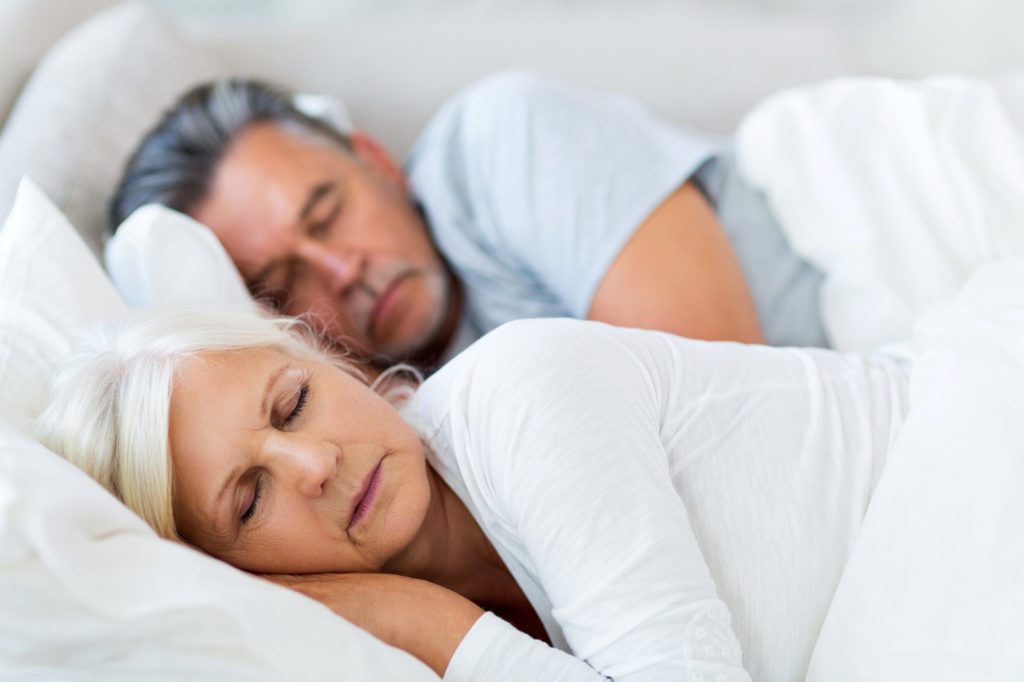Older Adults May Improve Deep Sleep With Noise

Older adults, whose sleep quality tends to decline with age, may want to find ways to sleep better. New research from researchers in Zurich suggests that pink noise may help improve older adults’ brain activity during deep sleep.
Pink noise includes sounds such as falling rain, a flowing river, crashing ocean waves, or rustling leaves. Like white noise, it covers all frequencies that humans can hear. It emphasizes lower frequencies.
Researchers played pink noise audio through a headband to 16 adults ages 62 to 78 while they slept in their homes. The study data showed that pink noise during deep sleep increased slow waves in the brain for some participants.
The study’s researchers note the potential in their findings: They used this fully remote method for stimulating the older adults’ brain waves. They say it’s possible to improve older adults’ sleep and brain function at home with sound.
Why Slow-Wave Sleep Is Important for Older Adults
Slow-wave brain activity is important, in part, because it helps us form memories. The brain cycles through three stages during sleep: first light sleep, then deep sleep, then rapid eye movement (REM). In the study, deep sleep was the stage in which the slow-wave brain activity increased with the use of pink noise.
When older adults’ sleep quality decreases, the slow waves may decrease, too. Because these memory-forming brain waves decrease as sleep quality does, improvement in such brain activity during sleep may help older adults’ brain function.
Why Do Older Adults Often Have Sleep Issues?
Older adults’ sleep changes as they age. Adults older than age 60 can lose 70% of their deep sleep, compared to adults age 25 and younger. If older adults’ deep sleep declines, then they may have fewer slow waves during that time. When slow waves decrease, brain health may worsen.
Caroline Lustenberger, Ph.D., junior group leader of the Neural Control of Movement Lab in Zurich, points out that sleep informs almost every part of our bodies’ functions, including “how our bodies age and how they prevent disease.” Therefore, Lustenberger says, restorative and deep sleep is important for our health.
Dr. W. Christopher Winter, a neurologist, sleep specialist, and author of the books “The Rested Child” and “The Sleep Solution,” notes that older adults’ sleep quality is worse than that of younger people. In addition to having fewer slow waves, older adults wake up more and have more trouble falling and staying asleep.
Some of these effects, Dr. Winter says, come from lifestyle changes people experience as they get older, such as exercising less. Other changes include a shift in the internal body clock, also known as the circadian rhythm.

Sounds May Help Older Adults, But There is Still More to Learn
Lustenberger hopes the findings from her recent study will build on an understanding that sleep experts have been developing for years.
A 2017 study found that playing sounds at certain frequencies enhanced slow-wave brain activity and improved sleep-dependent memory in older adults.
Researchers also studied this relationship in 2016. They found that playing noise when people reached deep sleep during a nap helped their declarative memory, which is long-term memory of facts or events.
Caveats remain. Dr. Winter cited the small number of study participants and its varied results. Noise helped some of the 16 participants greatly, while making no positive change in others’ sleep. The effects of the pink noise also varied from night to night for some participants. Researchers involved with the study also developed the headband, called the SleepLoop, through which they delivered pink noise to participants.
— Dr. W. Christopher Winter, neurologist, sleep scientist, and author
The use of this remote technology shows potential for future at-home methods that may help improve sleep quality with sound, however, researchers say.
“The bottom line is that there may be some kind of magic sound or secret chord that instantly improves sleep,” Dr. Winter says. “At this point, the [study’s] data is suggestive, but not compelling.”
In the meantime, Dr. Winter notes it’s important to know that pink noise is not the same type of sound one heard on a television or radio. People may use TVs and radios to settle their minds, Winter says. Noise from these devices can cause poorer sleep quality.
References
5 Sources
-
Lustenberger, C., Ferster, M.L., Huwiler, S. et al. Auditory deep sleep stimulation in older adults at home: a randomized crossover trial. Commun Med 2, 30 (2022).
http://www.nature.com/articles/s43856-022-00096-6 -
Neuroscience. 2nd edition. Purves D, Augustine GJ, Fitzpatrick D, et al., editors. Sunderland (MA): Sinauer Associates; 2001. Stages of Sleep. National Library of Medicine.2001. Accessed April 27, 2022.
http://www.ncbi.nlm.nih.gov/books/NBK10996 -
NIH News in Health. Sleep On It. How Snoozing Strengthens Memories. (April 2013)., Retrieved April 27, 2022.
https://newsinhealth.nih.gov/2013/04/sleep-it -
Papalambros, N. A., Santostasi, G., Malkani, R. G., Braun, R., Weintraub, S., Paller, K. A., & Zee, P. C. (2017). Acoustic enhancement of sleep slow oscillations and concomitant memory improvement in older adults. Frontiers in Human Neuroscience, 11, 109.
https://pubmed.ncbi.nlm.nih.gov/28337134/ -
Ong, J. L., Lo, J. C., Chee, N. I., Santostasi, G., Paller, K. A., Zee, P. C., & Chee, M. W. (2016). Effects of phase-locked acoustic stimulation during a nap on EEG spectra and declarative memory consolidation. Sleep medicine, 20, 88–97.
https://pubmed.ncbi.nlm.nih.gov/27318231/












































































